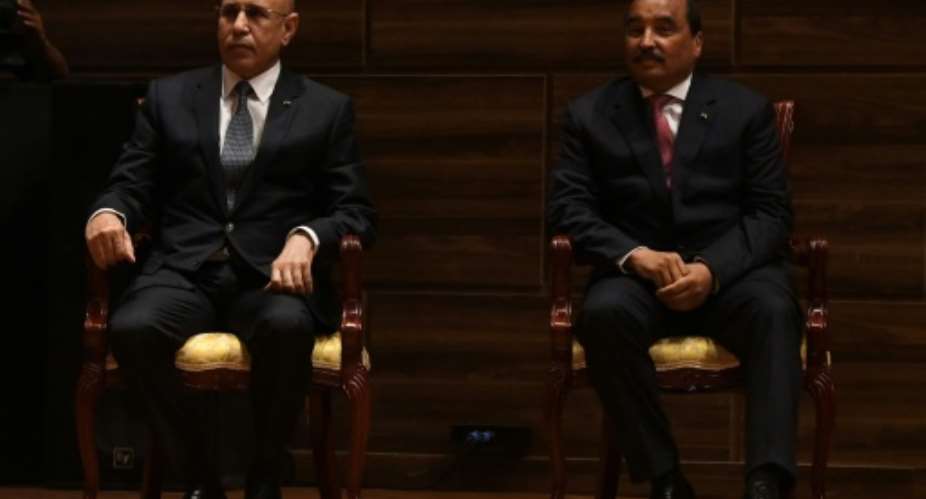In less than six months after he was elected, Mauritanian President Mohamed Ould Cheikh El Ghazouani has consolidated his grip on power, leaving on the sidelines his predecessor and one-time mentor, Mohamed Ould Abdel Aziz, a soldier who ran the African desert country for 10 years.
Early in 2019, suspicions ran high that Aziz, who came to power in a bloodless coup in 2008, wanted to breach the constitution and run for a third term.
Instead, the former general backed his loyal aide and defence minister, Ghazouani.
When Ghazouani took office in August, he swiftly began to consolidate power, dashing Aziz's hopes of rallying his support base and manipulating parliament.
Many people saw Ghazouani, a onetime chief of general staff, as the mastermind behind a security strategy that successfully kept jihadist movements out of Mauritania even as they ravaged parts of neighbouring Mali.
His victory at the polls in June became little more than a formality once he had enough support nationwide from the Union for the Republic (UPR), a party founded by Aziz in 2009, who won his first five-year term that year.
The change of regime was the first transfer of power between two elected heads of state in the vast Sahara nation on Africa's Atlantic coast, which was shaken by multiple coups d'etat from 1978 to 2008.
Before the vote, Aziz signalled he would not quit politics and intended to retain his control of the UPR.
But his protege has made it clear he has no intention of handing back the reins.
'A great strategist'
"President Ghazouani is a calm, discreet, cultivated man steeped in Mauritanian values," says writer and academic Idoumou Abbass.
"Moreover, Mauritanians have just discovered that the president's calm demeanour hides a man of power, decisive and a great strategist."
But Ghazouani's cool assertion of authority came as a bitter shock to his predecessor, who long muzzled the opposition and ruled for a decade, accustomed to loyalty, honours and glory.
The new leader dismissed the heads of the presidential guard appointed by Aziz and last weekend won the outright backing of the UPR during its party congress in Nouakchott, which notably was not attended by its founder.
Some 2,250 party delegates elected a new National Council without opposition.
To lead the council and the party, they on December 29 appointed Ghazouani's chosen candidate, Sidi Mohamed Ould Taleb Amar, who had for more than 10 years left domestic politics to serve as Mauritania's ambassador to China, Russia and the UN.
"This is a time of consensus around our President Ghazouani, who has convinced everybody, including the opposition. Nobody speaks any more of the other (Aziz), except on social media. He should go into retirement," UPR member Ahmed Ould Salem told AFP during the congress, despite longstanding support for the former president.
'Capacity to listen'
Aziz ruled Mauritania with an iron rod, jailing senators who opposed his abolition of the "useless, expensive" upper house after a controversial 2017 referendum in which a majority of 85 percent was officially held to agree with him.
In contrast, Ghazouani has given repeated signs of being open to contrary views at the same time as he broadens his political support base.
"He presented himself as a man of dialogue and consensus when speaking as a candidate, and he has governed the country for five months in a way that confirms this," according to Abbass.
On Saturday, the UPR admitted four new parties into its coalition, including Adil, an opposition movement whose two members of parliament will strengthen the large majority the UPR enjoys in the chamber.
The new head of state has also won over Sidi Mohamed Ould Boubacar, a former prime minister who came third in last year's presidential election. After a meeting with Ghazouani, Boubacar hailed his "great capacity to listen and his full readiness to meet all political forces."
Clearly feeling his own party slip from his grasp, Aziz held a press conference where he denounced "undermining, unconstitutional action, in total illegality, on the part of people who are not even members of the party, by the order of the authorities."
He also raised the possibility of founding a new party, but the official media did not attend the briefing.
But fresh elections are along way off, with parliamentary, regional and district polls in 2023 -- and the next presidential race not until in 2024.





 Whoever participated in the plunder of the state must be held accountable – Jane...
Whoever participated in the plunder of the state must be held accountable – Jane...
 A vote for John and Jane is a vote to pull Ghana from the precipice of destructi...
A vote for John and Jane is a vote to pull Ghana from the precipice of destructi...
 I’ll repay your abiding confidence with loyalty, understanding and a devotion to...
I’ll repay your abiding confidence with loyalty, understanding and a devotion to...
 ‘I’ve learnt deeply useful lessons for the future' — Serwaa Amihere breaks silen...
‘I’ve learnt deeply useful lessons for the future' — Serwaa Amihere breaks silen...
 I’m sorry for the embarrassment – Serwaa Amihere apologises for leaked sex video
I’m sorry for the embarrassment – Serwaa Amihere apologises for leaked sex video
 Dumsor: Matthew Opoku Prempeh not in charge of Energy sector – Minority
Dumsor: Matthew Opoku Prempeh not in charge of Energy sector – Minority
 Adu Boahen’s murder: Police arrest house help who was in possession of deceased’...
Adu Boahen’s murder: Police arrest house help who was in possession of deceased’...
 Akufo-Addo nominates Felicia Attipoe as Tema West MCE
Akufo-Addo nominates Felicia Attipoe as Tema West MCE
 Election 2024: I can't have someone I defeated twice as my successor – Akufo-Add...
Election 2024: I can't have someone I defeated twice as my successor – Akufo-Add...
